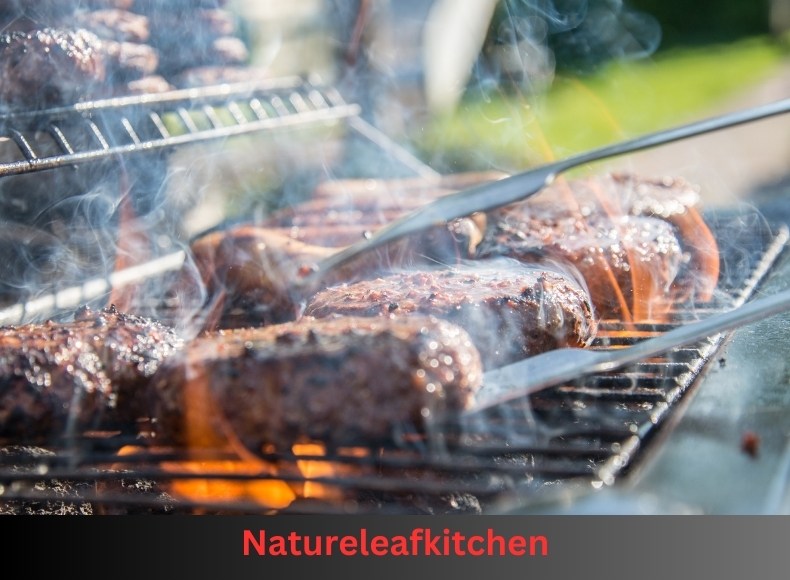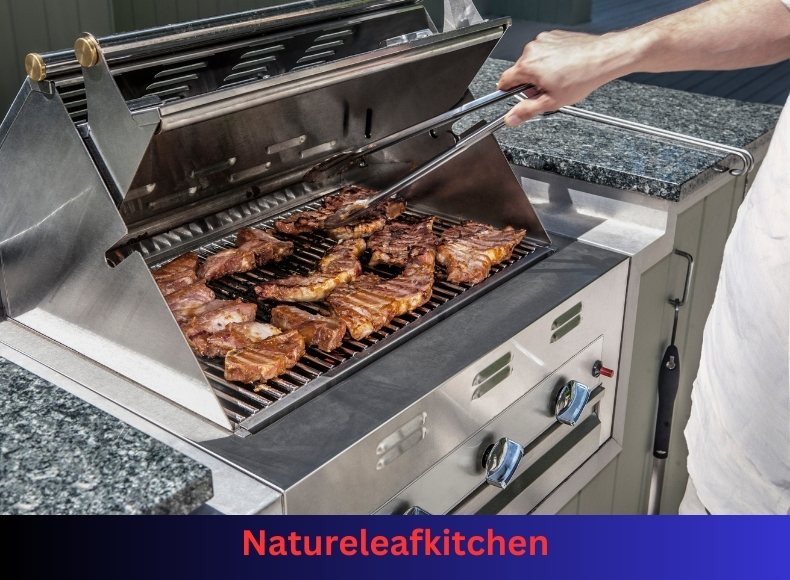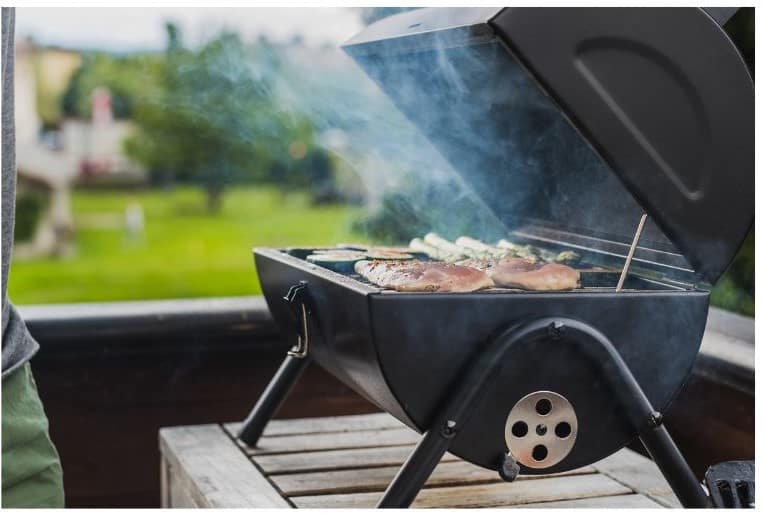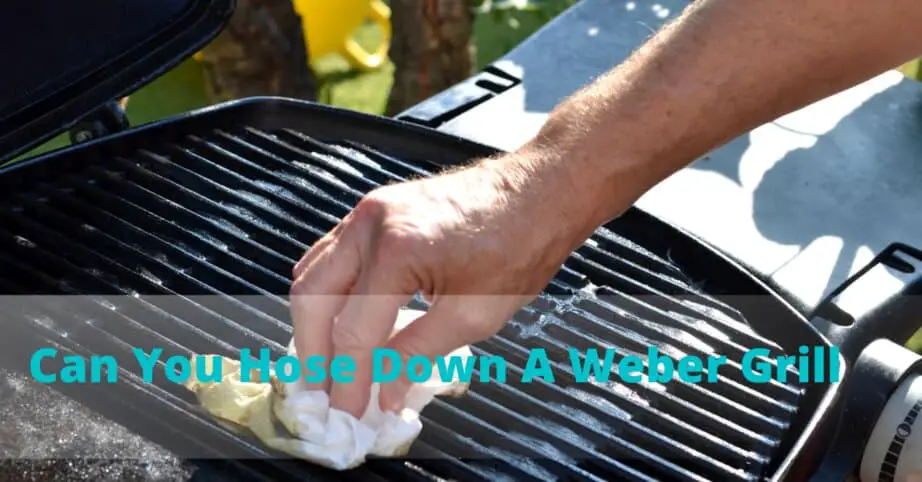To smoke a pork butt on a gas grill, set up for indirect heat and maintain a stable temperature of 225-250°F using soaked wood chips for smoke. Place the pork butt fat side up on the cool side of the grill and smoke until it reaches an internal temperature of 195-205°F.
Smoking a pork butt, also known as a Boston butt, on a gas grill blends traditional barbecue techniques with the convenience of modern grilling. Achieving that tender, fall-apart texture with a smoky bark is the holy grail for BBQ enthusiasts, and it’s entirely possible on your backyard gas grill.
The key lies in patience, temperature control, and smoke management—elements that transform a simple cut of pork into a mouthwatering feast. With the proper setup and attention, your gas grill can effectively mimic a smoker, rewarding you with succulent, richly flavored pork that’s perfect for pulled pork sandwiches, tacos, or to be enjoyed on its own with classic BBQ sides. Follow these straightforward steps, and you’re on your way to smoking a pork butt that could rival any pitmaster’s creation.

Introduction To Smoking On Gas Grills
Imagine infusing a pork butt with rich, smoky flavors right in your backyard. Gas grills present a convenient way to smoke meats like pork butt, often associated with traditional charcoal smokers.
The Appeal Of Slow-cooked Pork
Slow-cooked pork has a reputation for its tenderness and depth of flavor that can’t be rushed. Hours over low heat transform a pork butt into a succulent feast.
- Long cooking locks in juices.
- Low heat breaks down tough fibers.
- The meat falls apart with a gentle pull.
Benefits Of Using A Gas Grill
Using a gas grill for smoking offers distinct advantages. It combines the finesse of slow cooking with the precision of modern grilling.
| Convenience | Easy to start and maintain temperature |
|---|---|
| Control | Precise heat adjustments |
| Cleanliness | No charcoal mess to clean up |

Credit: www.amazon.com
Essential Tools And Ingredients
Welcome to the realm of flavors, where we dive into the art of smoking a pork butt on your trusty gas grill. Grilling enthusiasts know that mouthwatering results are just a few hours away with the right tools and the perfect cut of meat. Let’s gear up with the essentials to transform that hefty pork butt into a tender, smoky delight.
Selecting The Perfect Pork Butt
Choosing the right pork butt is the first step. Look for a cut with a pinkish-red color. It should feel firm and boast a healthy amount of marbling. This fat adds juiciness and flavor as it slowly cooks. A good size is between 5 to 8 pounds. A layer of fat on one side, known as the ‘fat cap’, should be about 1/4-inch thick. This layer will self-baste the meat. Remember, quality meat yields quality results, so opting for organic or well-sourced pork is worth considering.
Must-have Smoking Accessories
Smoking on a gas grill requires some key accessories to ensure a smooth and flavorful smoking process. See the below list to make sure you have everything:
- Wood chips – These come in various flavors like hickory or applewood. They add a smoky taste.
- Smoker box – This holds the wood chips and lets the smoke disperse evenly.
- Meat thermometer – Essential for checking the internal temperature to ensure perfectly cooked pork.
- Aluminum foil – Handy for wrapping the meat during the final phase to keep it moist.
- Grill gloves – Protect your hands when checking the meat or handling the smoker box.
Gather these items and you are set to start the smoking adventure. Embrace the process and get ready for a culinary feast straight from your gas grill.
Pork Butt Preparation
Pork Butt Preparation is a crucial step in crafting a mouthwatering barbecued masterpiece on your gas grill. Proper preparation can elevate the flavor and tenderness of your pork butt, setting the stage for a delicious, smoky delight.
Trimming And Knife Skills
Begin with a sharp knife and your pork butt, which might have a thick layer of fat. While some fat is good for maintaining moisture and adding flavor, too much can prevent seasoning penetration and result in uneven cooking. Aim for a fat cap about one-quarter inch thick.
A steady hand and careful trimming will shape your pork perfectly. Slice off any excess fat and remove loose pieces of meat. A well-trimmed pork butt allows heat to distribute more evenly and enhances the smokiness.
Seasoning For Optimum Taste
Seasoning properly can transform your pork butt from plain to extraordinary. A basic rub starts with:
- Salt and black pepper to build the base layer of flavor.
- Brown sugar for a hint of sweetness and caramelization.
- Paprika, garlic powder, and onion powder for a classic barbecue profile.
- Optional spices like cayenne for heat or cumin for earthiness.
Apply the rub generously, covering every nook and cranny. For the best results, let the seasoned pork butt rest in the fridge for at least an hour. This allows the seasoning to meld with the meat, creating a flavor-packed crust during smoking.

Setting Up Your Gas Grill
Before you dive into smoking a succulent pork butt, setting up your gas grill is crucial. Establishing the right conditions on your gas grill will make all the difference.
Creating Indirect Heat ZonesCreating Indirect Heat Zones
To smoke meat, a consistently low temperature is key. Create indirect heat zones on your gas grill for even cooking.
- Turn on one burner to low or medium.
- Keep the burner on the opposite side.
- Place the pork butt on the side with the burner off.
This configuration circulates heat, enveloping the meat in consistent warmth without direct flame exposure.
Using Wood Chips for SmokeUsing Wood Chips For Smoke
The real secret to that smoky flavor is wood chips. Adding wood chips to your gas grill infuses the pork butt with smoky aroma.
- Soak wood chips in water for at least 30 minutes.
- Drain the chips and wrap them in aluminum foil.
- Poke holes in the foil to let smoke escape.
- Place the foil packet directly on the active burner.
The soaked wood chips slowly smolder, producing the smoke that permeates the pork, transforming it into a mouth-watering meal.
Mastering Temperature Control
If you dream of a mouth-watering, smoky pork butt, the secret lies in temperature control. On a gas grill, this can be a fine art. With the right techniques, you can create a steady low-and-slow environment, perfect for breaking down all the tough fibers in the pork. It’s this low and slow approach that transforms your pork butt into an irresistible, tender delight. Let’s dive into mastering the art of temperature control on your gas grill.
Ideal Smoking Temperatures
Consistency is key when smoking a pork butt. Aim for a temperature range of 225°F to 250°F. This sweet spot allows the meat to cook evenly, soaking up all the smoky flavors without drying out.
- Preheat your grill to 225°F.
- Place wood chips or pellets in a smoker box or foil pouch.
- Maintain the temperature within the ideal range throughout cooking.
Monitoring The Grill’s Heat
Constant vigilance ensures perfection. Use a reliable grill thermometer to monitor your gas grill’s temperature. Place it close to the pork butt for accurate readings.
- Check the temperature every hour.
- Adjust the burners as needed to maintain the ideal range.
- Remember, external factors like wind or weather can affect the heat, so stay alert.
By sticking to these guidelines, you’ll find that patience pays off in the form of perfectly cooked pork. So get your grill going, and let’s turn that pork butt into a masterpiece!
The Art Of Smoking Pork Butt
The Art of Smoking Pork Butt transforms a simple cut of meat into a tantalizing feast. This smoking method infuses deep flavors and tenderizes the pork to perfection.
Placing The Meat On The Grill
Initiate the process by setting your gas grill to a low temperature. You want a range that mimics a smoker’s slow and steady heat.
- Pat the pork butt dry with paper towels.
- Rub your choice of seasonings onto the meat for a flavor-packed crust.
- Position the pork butt fat side up on the grill. This method allows the fat to self-baste the meat.
- Use a meat thermometer to ensure precision in cooking.
Managing Smoke Flow And Flavor
Create a smoker box or purchase one to hold wood chips. Place the box on the grill to generate smoke.
- Soak the wood chips in water for at least 30 minutes before use.
- Enclose the wood chips in aluminum foil if you do not have a smoker box. Poke holes in the top to allow smoke to escape.
- Place the smoker box or foil pouch over a lit burner.
- Control the grill’s temperature to keep it low and steady, ideally around 225 degrees Fahrenheit.
- Adjust the burners as necessary to maintain consistent smoke and temperature.
Tip: Choose wood chips like hickory or apple for specific flavor profiles.
Timing And Patience
Mastering the art of smoking a pork butt on a gas grill is a blend of careful timing and patience. Slow and steady wins the race in this culinary adventure, ensuring every bite is tender and flavorful. Let’s dive into the key aspects of achieving that perfect smoke ring and succulent texture.
Expected Cooking Durations
Each pork butt is unique, but general cooking times can help guide the process. Expect a process taking several hours, focusing on low and slow heat.
| Pork Butt Weight | Estimated Time |
|---|---|
| 4-6 lbs | 6-8 hours |
| 7-10 lbs | 9-11 hours |
These times are approximations. Monitor temperature closely for the best result.
Signs That Pork Butt Is Ready
Looking for doneness signs ensures your pork butt is perfectly smoked. Start by checking:
- Internal Temperature: Aim for 195-205°F for ideal tenderness.
- Meat Texture: Meat should pull apart easily. Use a fork to test.
- Color: Look for a dark, caramelized exterior with a pink smoke ring.
Resting the meat for at least an hour after cooking is crucial. This results in juices redistributing, and enhancing flavor.
Resting And Serving
Mastering the art of smoking a pork butt on a gas grill involves more than just cooking. The ‘Resting and Serving’ stage is crucial for perfect tenderness and flavor. Let’s break down the final steps: resting the meat and presenting it in glory.
Importance Of Resting Meat
When your pork butt reaches that perfect internal temperature, resist the urge to cut into it immediately. Resting is key to keeping the meat juicy and delicious. Here’s why:
- Resting allows the juices to redistribute throughout the meat.
- It ensures that every slice is moist and flavorful.
- Temperature can continue to rise, finishing the cooking process gently.
Cover the meat with foil and let it sit for at least 20 to 30 minutes. Larger cuts can benefit from a longer rest.
Carving And Presentation Tips
Now comes the moment of truth: carving your masterpiece. For the best eating experience, follow these tips:
| Tip | Description |
|---|---|
| Use a Sharp Knife | A sharp knife ensures clean cuts without shredding the meat. |
| Slice Against the Grain | Short fibers in each slice make the pork butt more tender. |
| Thick or Thin | Choose thick slices for plates or thin ones for sandwiches. |
Arrange the pork on a serving platter, showcasing the succulent interior. Pair it with sides that complement the smoky flavor, and you’re ready to feast!
Additional Tips And Tricks
Welcome to the “Additional Tips and Tricks” portion of our guide on smoking a pork butt on a gas grill! Smoking meats can seem daunting, but with these extra nuggets of wisdom, you’ll be well on your way to impressing friends and family with your culinary prowess. Let’s dive into some key strategies to elevate your smoking game.
Dealing With Flare-ups
Flare-ups are sudden bursts of high flames. They can be caused by dripping fat or increased heat. Keeping an eye on the grill is crucial. To manage flare-ups, use these steps:
- Trim excess fat from the pork butt to reduce the chance of flare-ups.
- Keep a portion of the grill free of heat (‘indirect cooking‘) to move the meat if flare-ups occur.
- Use a water spray bottle to douse flames if they get too high.
- Clean your grill regularly to prevent build-up that can ignite.
Incorporating Side Dishes
While the star of the show is the smoked pork butt, side dishes contribute to a memorable feast. Here are tips to include them:
- Choose side dishes that can cook at similar temperatures, without overpowering the grill.
- Wrap veggies in foil and place them on the upper rack to cook in the pork’s delicious drippings.
- Cook beans or potatoes beneath the pork to absorb the smokey flavors.
- Remember, timing is key! Add sides during the last hour of smoking to ensure everything is ready together.
Keeping these tips in mind will help you create a balanced meal that complements your perfectly smoked pork butt. Prepare to impress with a main course and an entire spread showcasing your grilling expertise!
FAQs
What Temperature For Smoking Pork Butt?
Maintaining a consistent temperature of 225-250°F is optimal for smoking a pork butt on a gas grill.
How Long To Smoke A Pork Butt?
Typically, smoking a pork butt takes about 1. 5 hours per pound at the recommended temperature.
Should I Wrap My Pork Butt In Foil?
Wrapping your pork butt in foil after a few hours of smoking can help retain moisture, speeding up the cooking process.
Conclusion
Mastering the art of smoking a pork butt on a gas grill can transform your backyard barbecues. With patience and precise temperature control, you’ll always serve succulent, smoky pork. Embrace these techniques, invite friends, and enjoy the praise your grilling skills deserve.
Fire up that grill and let’s get cooking!




